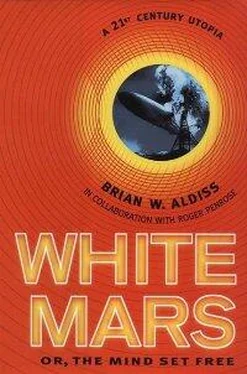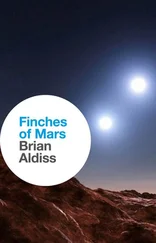Brian Aldiss - White Mars
Здесь есть возможность читать онлайн «Brian Aldiss - White Mars» весь текст электронной книги совершенно бесплатно (целиком полную версию без сокращений). В некоторых случаях можно слушать аудио, скачать через торрент в формате fb2 и присутствует краткое содержание. Год выпуска: 1999, ISBN: 1999, Издательство: Little, Brown UK, Жанр: Фантастика и фэнтези, на английском языке. Описание произведения, (предисловие) а так же отзывы посетителей доступны на портале библиотеки ЛибКат.
- Название:White Mars
- Автор:
- Издательство:Little, Brown UK
- Жанр:
- Год:1999
- ISBN:0-316-85243-0
- Рейтинг книги:5 / 5. Голосов: 1
-
Избранное:Добавить в избранное
- Отзывы:
-
Ваша оценка:
- 100
- 1
- 2
- 3
- 4
- 5
White Mars: краткое содержание, описание и аннотация
Предлагаем к чтению аннотацию, описание, краткое содержание или предисловие (зависит от того, что написал сам автор книги «White Mars»). Если вы не нашли необходимую информацию о книге — напишите в комментариях, мы постараемся отыскать её.
White Mars — читать онлайн бесплатно полную книгу (весь текст) целиком
Ниже представлен текст книги, разбитый по страницам. Система сохранения места последней прочитанной страницы, позволяет с удобством читать онлайн бесплатно книгу «White Mars», без необходимости каждый раз заново искать на чём Вы остановились. Поставьте закладку, и сможете в любой момент перейти на страницу, на которой закончили чтение.
Интервал:
Закладка:
The scene flipped to a schoolroom, where Belle Rivers was talking with a jeuwu class of ten children. Steve moved a pointer on to Belle, touched a key, and at once a scroll of characteristics came up: Belle’s birth date and place, her entire CV and many other details. They flashed on the screen and were gone at another touch of a key.
“We call these simulated objects and people emulations, they are so precise,” said Steve. “To them, their world is perfectly real. They sure think and act like real.”
“But they are mere electronic images. They can’t be said to think.”
Steve laughed. “Guess they don’t realise they’re just a sequence of numbers and colours in a computer, if that’s what you mean.” He added, in lower key, “How often do we realise we’re also just a sequence in another key?”
I said nothing.
The people on screen were now gathering in the main thoroughfare. This was recognisably the day the third marathon was held. There were the runners, many with false wings attached to them. There were the officials who ran the race. There were the crowds.
A whistle blew and the runners started forward, struggling for space, so closely were they packed, even as they had done weeks previously.
“All this takes real heavy puting power, even using the quantputer,” Steve said. “That’s why we are running some weeks behind real time. We’re working on that problem.” The runners began to trot, jostling closely for position. “I guess we’ll catch up eventually.”
“Want to bet on who will win?” Dayo asked mischievously.
“You see this is a kind of rerun of the marathon,” Steve said. “And now, I just tap on a couple of keys…”
He did so. The screen was filled with phantom creatures, grey skeletons with strange pumping spindles instead of legs, naked domes for heads, their teeth large and bared. The inhuman things pressed onwards, soundless, joyless … The Race of Death, I thought.
“We got the X-ray stuff off the hospital,” Steve said. “It’s spare diagnostic equipment…”
The skeletons streamed on, with ghostly grey buildings as background, racing through their silent transparent world.
Steve tapped his keyboard once more and the world on the screen became again the one we recognised as ours.
With a flash of humour, he said, “You have your Utopia, Tom. This is our baby. How do you like it?”
“But in the wrong hands…” I began. A feeling of nausea silenced me.
Dayo took my arm. “I want you to watch yourself as an emulation, Tom. Please, Steve…”
Steve touched a couple of keys on his keyboard. The scene changed. An office block along the marathon course came into focus. Moving through the window, the emulation picked out a man and two women, standing close together, watching the runners pass their building. I recognised Cang Hai, Mary Fangold and myself.
My emulation clutched his head and went to the back of the room to sit on a sofa. Cang Hai came over to it and stood there in silence, looking down at its—my—bowed head. After a moment, I stirred myself, smiled weakly at Cang Hai, rose, and returned to the window to watch the runners.
“I don’t remember doing that,” I said.
“The CV, Steve,” Dayo prompted.
The key. My details, my birth date and place, my CV. Momentarily my skeletal self was there, grey, drained of all but emptiness, long bony fingers clutching at my ostrich egg of skull. Then: “Diagnosis: Suffers from untreated brain tumour”. Only later did it occur to me that had I died then, my emulation would have continued to live, at least for a while.
I found Steve gazing at me and stroking his beard. “You better get yourself looked after, chum,” was all he said.
The old R A hospital was greatly enlarged in order to cope with its new general functions. Entry was through an airlock, the hospital atmosphere being self-contained against external emergencies and slightly richer in oxygen than in the domes in order to promote feelings of well-being. Extensive new wards had been built and a nanotechnology centre added, where cell repair machines were housed.
I must confess to feeling nervous as I entered the doors. I was greeted warmly by the hospital personnel manager, Mary Fangold.
As we shook hands, her dark blue eyes scrutinised me with more than professional interest.
“You’re in good hands here, Tom Jefferies,” she said. “We are all admirers of your Utopian vision, which is carried out in our hospital as far as is possible. I hope to take care of you personally. We are treating only a few persistent sore-throat and eye cases at present.
“We regard those who are ill and enter here less as patients than as teachers who bring with them an opportunity for us to study and repair illness. Our progress is less towards health than towards rationality, which brings health.”
When I remarked that, despite her kind sentiments, the old, the ageing, would become a burden, she denied it. No, she said, the burdens of old age had been greatly exaggerated in former times. The old and experienced, the DOPs, cost very little. On Earth, many of them had savings that they gradually released after retirement on travel and suchlike. Thus they contributed to society and the economy. Their demands were much fewer than were those of the young.
I asked her if she was keen to return to Earth, to practise there.
She smiled, almost pityingly. Not at all, was her answer. “The elements in the formula have been reduced here to a manageable level.”
She was determined to remain on Mars in her interesting experimental situation, free of many diseases which plagued Earth, helping to bring about a Utopian phase of human life. For her money, we could remain cut off for good! Were not working and learning the great pleasures for anyone of rational intelligence?
She and a nurse conducted me to a ward-lounge, where we sat over coffdrink gazing out of windows that showed simulated views of beach, palm trees and blue ocean, where windsurfers rode the breakers.
Continuing her discourse, Mary said that it was the young who were expensive. Child benefits, constant supervision and education, health care, the devastations of drink and drugs, and—at least on Earth—crime, all formed major items in any nation’s financial regimen of expenditure. Contrary to the general consensus that children were a blessing, she maintained they were rather a curse; not only were they an expense, but they forced their parents to participate in a second childhood while rearing them. She regarded this as an irrational waste of years of young adulthood.
“It’s true,” I answered, “that most crime on Earth is committed by the young. Whereas, if I recall the statistic correctly, the over-seventies account for only 1.3 per cent of all arrests.”
“Yes. Mainly for dangerous driving, the occupational hazard of the age! Happily, we do not have that problem on Mars.”
We laughed together. But her laughter was rather abstracted. She began thinking aloud. Belle Rivers’s jeuwu did not carry matters far enough. Although Mary had nothing against children per se, she would like to see them removed from their parents at birth, to be reared in institutions where every care would be lavished on them; protected from the amateurishness and eccentricity—if not downright indifference—of their parents, they would grow up much more reasonably. She repeated this phrase in a thoughtful manner. Much more reasonably…
Knowing that Mary Fangold had been disappointed by the establishment of the Birth Room, I asked her how she regarded the matter now.
“As a rational person, I accept the Birth Room as an experiment. I do not oppose the Birth Room. Indeed, I permit my midwives to go there when summoned. However, its function is undoubtedly divisive. The division between the sexes is increased. The role of the father is curtailed.”
Читать дальшеИнтервал:
Закладка:
Похожие книги на «White Mars»
Представляем Вашему вниманию похожие книги на «White Mars» списком для выбора. Мы отобрали схожую по названию и смыслу литературу в надежде предоставить читателям больше вариантов отыскать новые, интересные, ещё непрочитанные произведения.
Обсуждение, отзывы о книге «White Mars» и просто собственные мнения читателей. Оставьте ваши комментарии, напишите, что Вы думаете о произведении, его смысле или главных героях. Укажите что конкретно понравилось, а что нет, и почему Вы так считаете.










